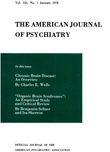Cortisol secretion and dexamethasone response in depression
Abstract
The authors administered 2 mg of dexamethasone at 11:00 p.m. to 37 unmedicated hospitalized endogenously depressed patients and assessed their plasma cortisol response at 4:00 and 11:00 p.m. the next day. In addition, on nondexamethasone days 26 of these patients had mean 24- hour plasma cortisol concentration determinations from samples taken at 30-min intervals and 32 had plasma determinations from a single sample taken at 4:00 and 11:00 p.m. Mean 24-hour plasma cortisol concentration was elevated in 50%; only 7 of the 26 were dexamethasone resistant, and 6 of these 7 were hypersecretors. The authors suggest that dexamethasone resistance reflects the abnormality of cortisol hypersecretion in depression and that the 2-mg dexamethasone suppression test is a highly specific but not very sensitive indicator of hypersecretion.
Access content
To read the fulltext, please use one of the options below to sign in or purchase access.- Personal login
- Institutional Login
- Sign in via OpenAthens
- Register for access
-
Please login/register if you wish to pair your device and check access availability.
Not a subscriber?
PsychiatryOnline subscription options offer access to the DSM-5 library, books, journals, CME, and patient resources. This all-in-one virtual library provides psychiatrists and mental health professionals with key resources for diagnosis, treatment, research, and professional development.
Need more help? PsychiatryOnline Customer Service may be reached by emailing [email protected] or by calling 800-368-5777 (in the U.S.) or 703-907-7322 (outside the U.S.).



